Building a New Ecosystem of Digital and Intelligent TVET and Creating a Brighter Future for Intelligent Talent Cultivation — Forum on “Digital Transformation in TVET” Held in Beijing
date:2025-09-01 14:52author:adminsource:Smart Learning Instituteviews:
On the morning of August 19, the Forum on “Digital Transformation in TVET”, part of the Global Smart Education Conference 2025 (GSE2025), was successfully held at Beijing Normal University. Representatives from education authorities, international organizations, vocational institutions, and renowned technology companies across China, the Maldives, Germany, Rwanda, Southeast Asia, and other regions gathered at the forum. They engaged in in-depth discussions on topics such as the development of digital platforms, occupational and curriculum standards, intelligent tutoring and assessment, and university-enterprise collaboration in Technical and Vocational Education and Training (TVET), aiming to forge a better future for the TVET sector.
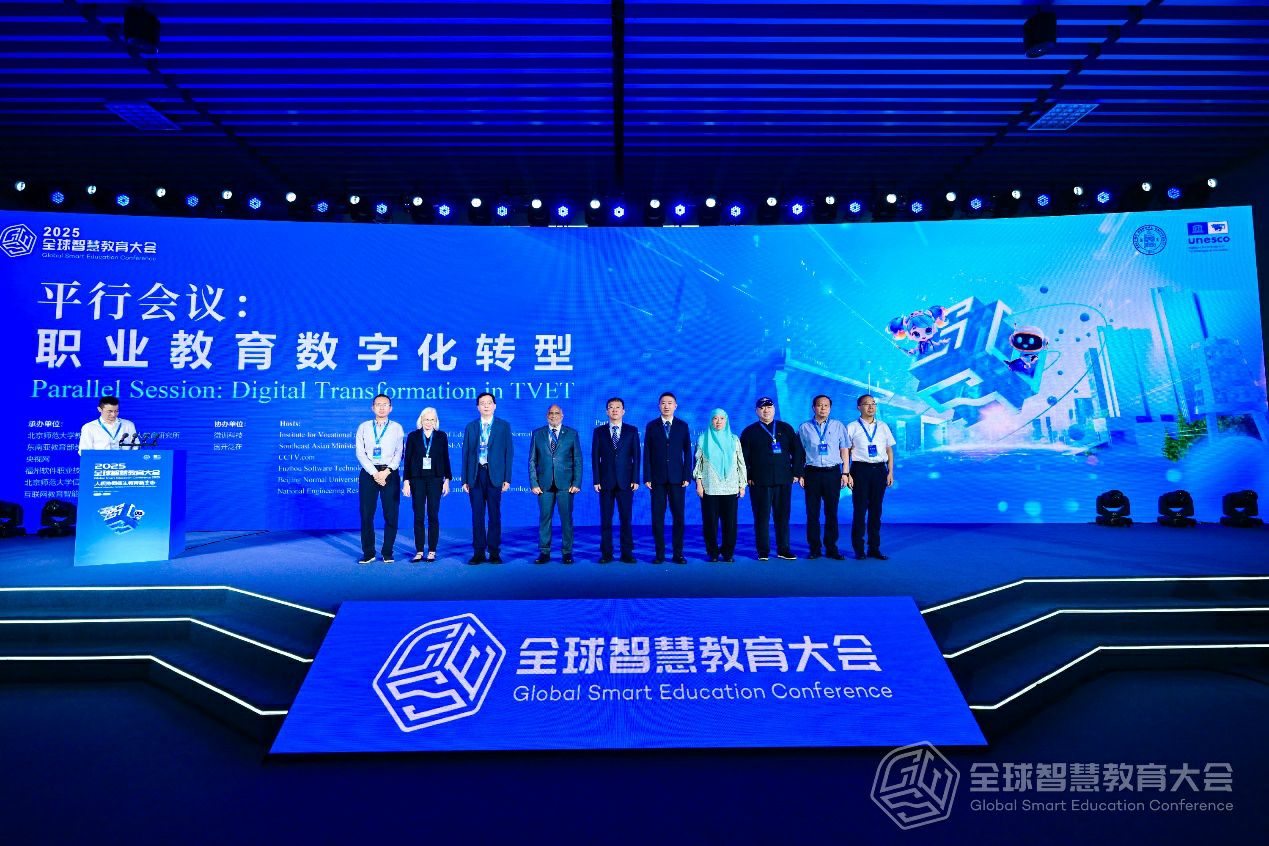
Group photo of attendees
The forum was organized by the Institute for Vocational and Adult Education, Faculty of Education, Beijing Normal University, the Southeast Asian Ministers of Education Organization (SEAMEO), CCTV.com, Fuzhou Software Technology Vocational College, the Center of Information & Network Technology of Beijing Normal University, and the National Engineering Research Center of Cyberlearning and Intelligent Technology, in collaboration with Beijing Weixun Technology Co., Ltd. and OUC Ubiquitous (Beijing) Education Technology Co., Ltd. It was divided into four sessions: opening remarks, keynote speeches, release, and invited speeches.
During the opening remarks session, Mr. LI Zhi, Deputy Director of the Department of Vocational and Adult Education, Ministry of Education, P.R. China, emphasized that China has fully launched the “National Educational Digitalization Strategy Initiative 2.0” to realize “five major synchronous leaps” in TVET. In terms of strategic positioning, it will evolve from teaching tools to an intelligent ecosystem; for technical approach, it will upgrade from “Internet + education” to “AI + education”; regarding development focus, it will shift from resource coverage to standard leadership; concerning learning models, it will transition from standardized instruction to personalized cultivation; and as for governance capability, it will advance from platform operation and maintenance to data-driven governance. As he said, pilot cities such as Beijing, Shanghai, and Chengdu have already achieved phased outcomes in scenarios like AI-assisted lesson preparation, virtual experiments, and future classrooms. In addition, the world’s first Large Model for Education—Overall Reference Framework Alliance Standard was recently released, offering Chinese solutions for ethical and copyright issues in educational AI.
During the opening remarks session, Mr. LI Zhi, Deputy Director of the Department of Vocational and Adult Education, Ministry of Education, P.R. China, emphasized that China has fully launched the “National Educational Digitalization Strategy Initiative 2.0” to realize “five major synchronous leaps” in TVET. In terms of strategic positioning, it will evolve from teaching tools to an intelligent ecosystem; for technical approach, it will upgrade from “Internet + education” to “AI + education”; regarding development focus, it will shift from resource coverage to standard leadership; concerning learning models, it will transition from standardized instruction to personalized cultivation; and as for governance capability, it will advance from platform operation and maintenance to data-driven governance. As he said, pilot cities such as Beijing, Shanghai, and Chengdu have already achieved phased outcomes in scenarios like AI-assisted lesson preparation, virtual experiments, and future classrooms. In addition, the world’s first Large Model for Education—Overall Reference Framework Alliance Standard was recently released, offering Chinese solutions for ethical and copyright issues in educational AI.
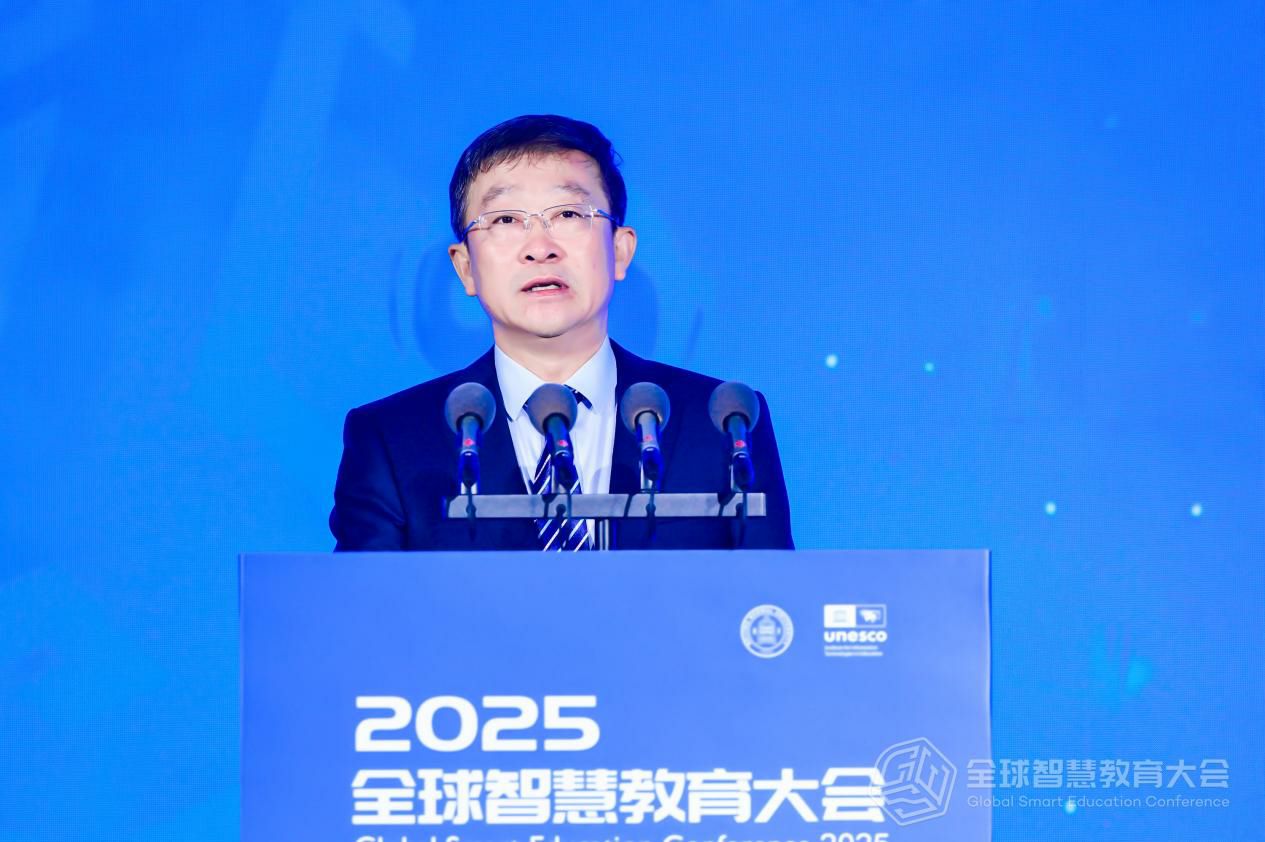
Mr. LI Zhi, Deputy Director of the Department of Vocational and Adult Education, Ministry of Education, P.R. China
H.E. Dr. Ali Haidar Ahmed, Minister of Higher Education, Labour, and Skills Development, Republic of Maldives, stated that digitalization is no longer an option but a strategic pillar for enhancing national competitiveness. He called for the establishment of integrated digital learning platforms and the promotion of immersive simulations and adaptive technologies, to enable “on-demand learning.” Additionally, he highlighted the need to deepen university-enterprise collaboration through these platforms, enabling students to access virtual internships and obtain skill certifications anytime, anywhere.
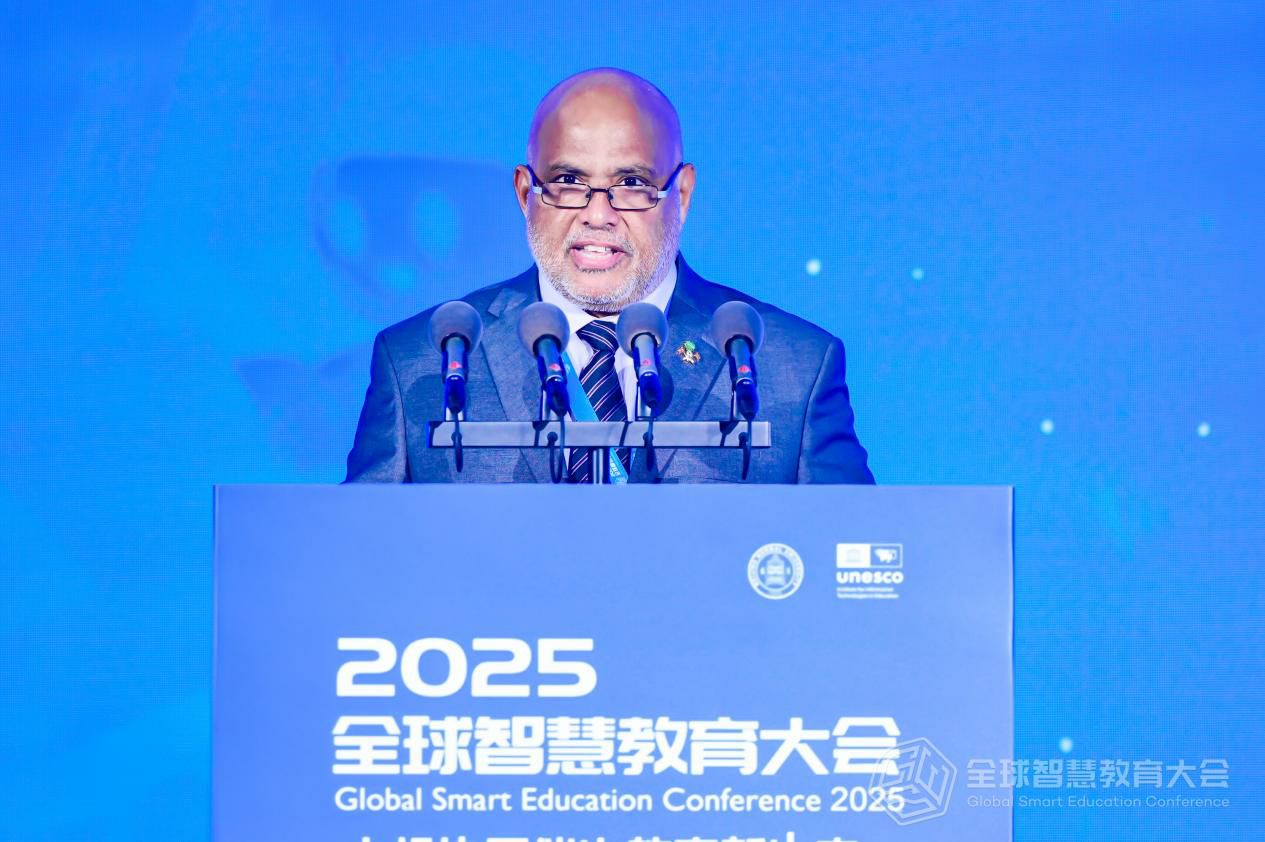
H.E. Dr. Ali Haidar Ahmed, Minister of Higher Education, Labour, and Skills Development, Republic of Maldives
Mr. FENG Yu, General Manager of Sports Entertainment and Education Business Group of CCTV.com, China, proposed three initiatives from a media perspective: consolidating the digital infrastructure to establish a “new foundational system” for TVET; enhancing open cooperation and launching the “five ones” measures to build a community characterized by integration of industry and education; and promoting resource sharing through introducing an AI campus toolkit and digital artificial factories to bridge digital divides among regions and schools. He noted that these efforts will provide more than 30 million vocational college students with equitable access to high-quality education.
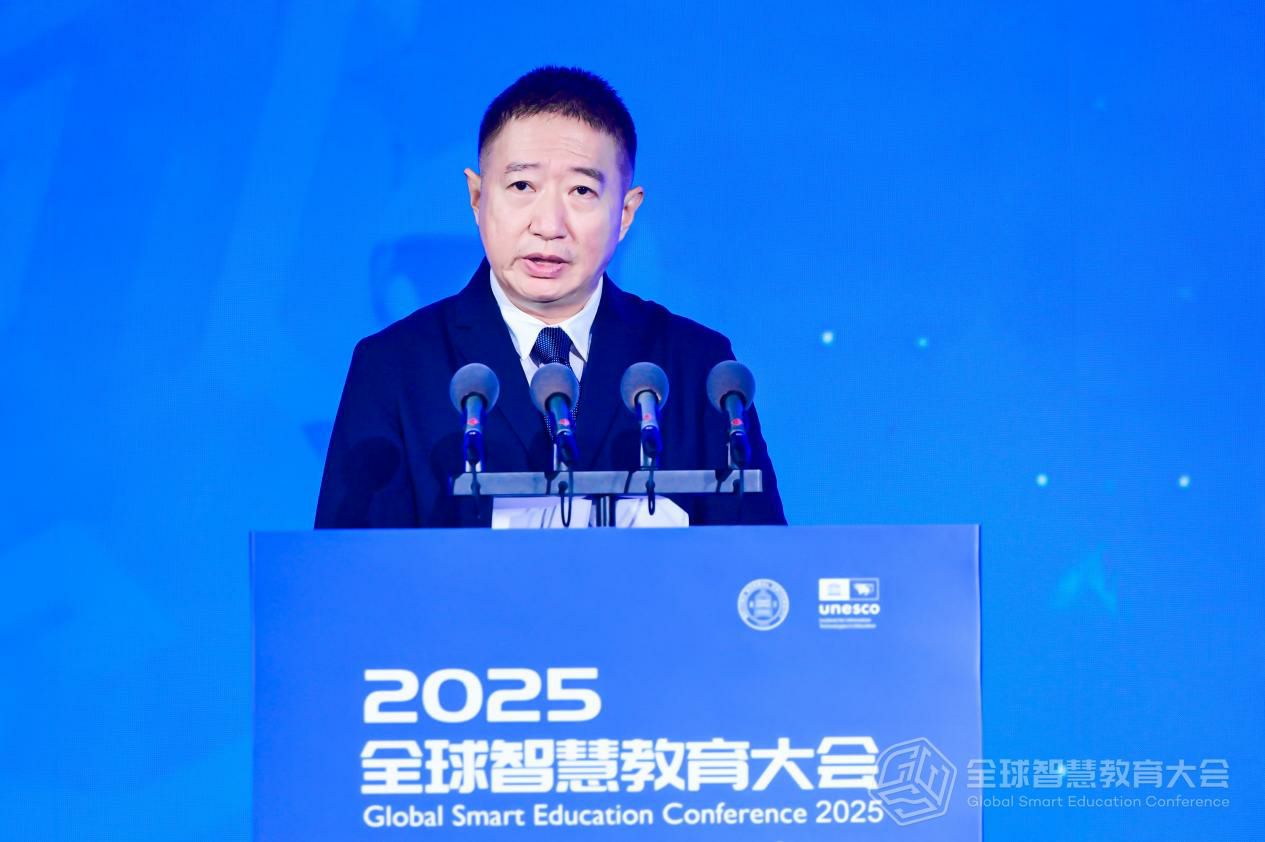
Mr. FENG Yu, General Manager of Sports Entertainment and Education Business Group of CCTV.com, China
Dr. Andreas Schleicher, Director for Education and Skills at the Organization for Economic Co-operation and Development (OECD), pointed out that the latest survey data show a record high level of uncertainty among 15-year-olds worldwide regarding their future careers. In this context, he emphasized that the digital transformation in TVET needs to bridge the gap between aspirations and capabilities through “digital career guidance.” He praised countries such as China for utilizing AI and virtual apprenticeship systems to bring high-end vocational experiences to even the most remote corners of the world, creating broader future opportunities for disadvantaged youth.
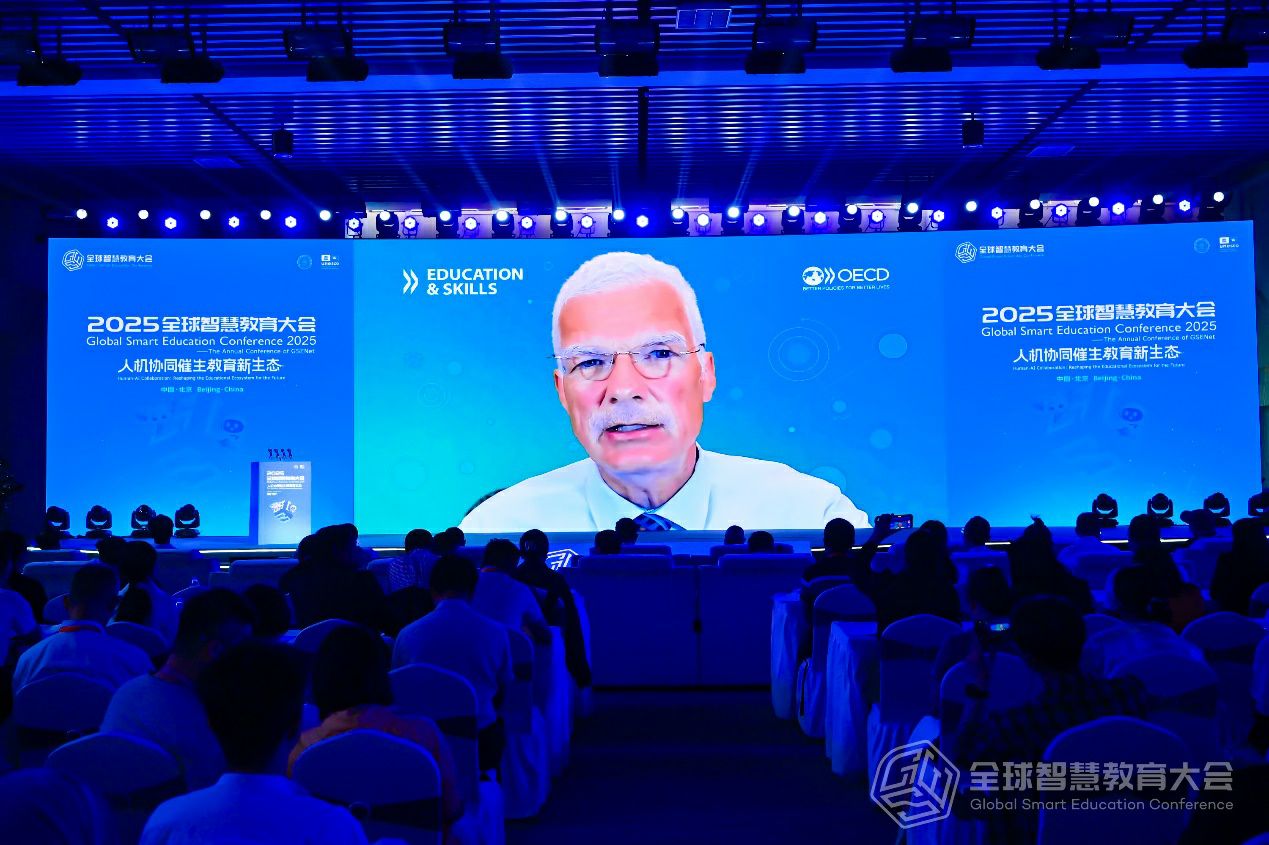
Dr. Andreas Schleicher, Director for Education and Skills at the Organization for Economic Co-operation and Development (OECD)
During the keynote speech session, Datuk Dr. Habibah Abdul Rahim, Secretary-General of Secretariat of Southeast Asian Ministers of Education Organization (SEAMEO), noted that the digital readiness of TVET in Southeast Asia remains at a “learner stage,” and it is necessary to accelerate the integration of technology into teaching through policy-industry collaboration to narrow gaps.
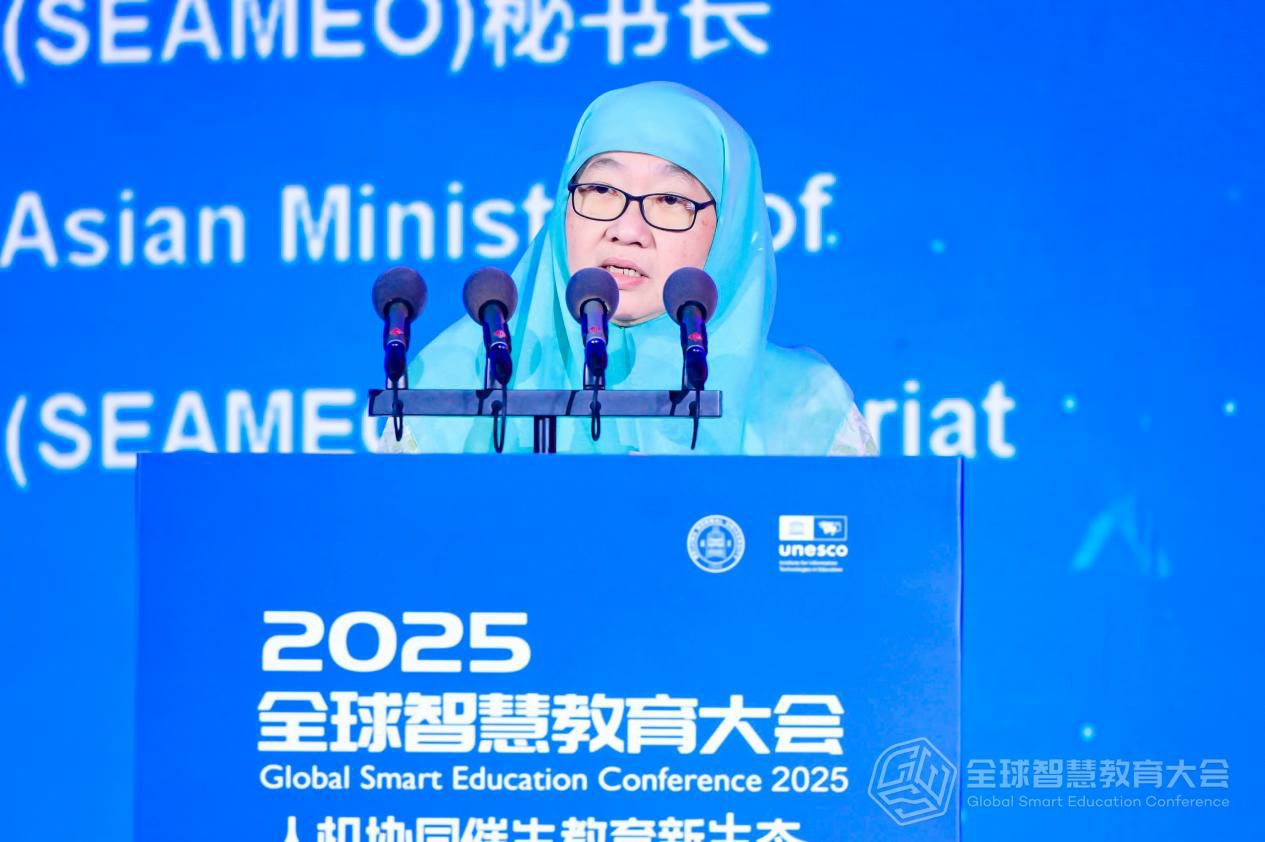
Datuk Dr. Habibah Abdul Rahim, Secretary-General, Secretariat, Southeast Asian Ministers of Education Organization (SEAMEO)
Prof. HE Zhen, Director of the Institute for Vocational and Adult Education, Faculty of Education of Beijing Normal University, Director of the National Institute of Vocational Education, and Member of the Teaching Steering Committee for Teacher Training in Higher and Secondary Vocational Colleges, Ministry of Education, P.R. China, shared that Beijing Normal University has leveraged the National Institute of Vocational Education and high-end think tanks to build a database comprising 100,000 student records and 7,000 teacher profiles. The university has also released China’s Exploration of Vocational Education Modernization, responding to the vocational reshaping through the “curriculum task theory + teaching action theory” in the intelligent era. He proposed to take “digital-intelligent work tasks” as a new anchor for TVET development and achieve the integration of industry and education, lifelong learning, and skill iteration through six key conditions, including AI-generated courses, virtual internships, and blockchain certification.
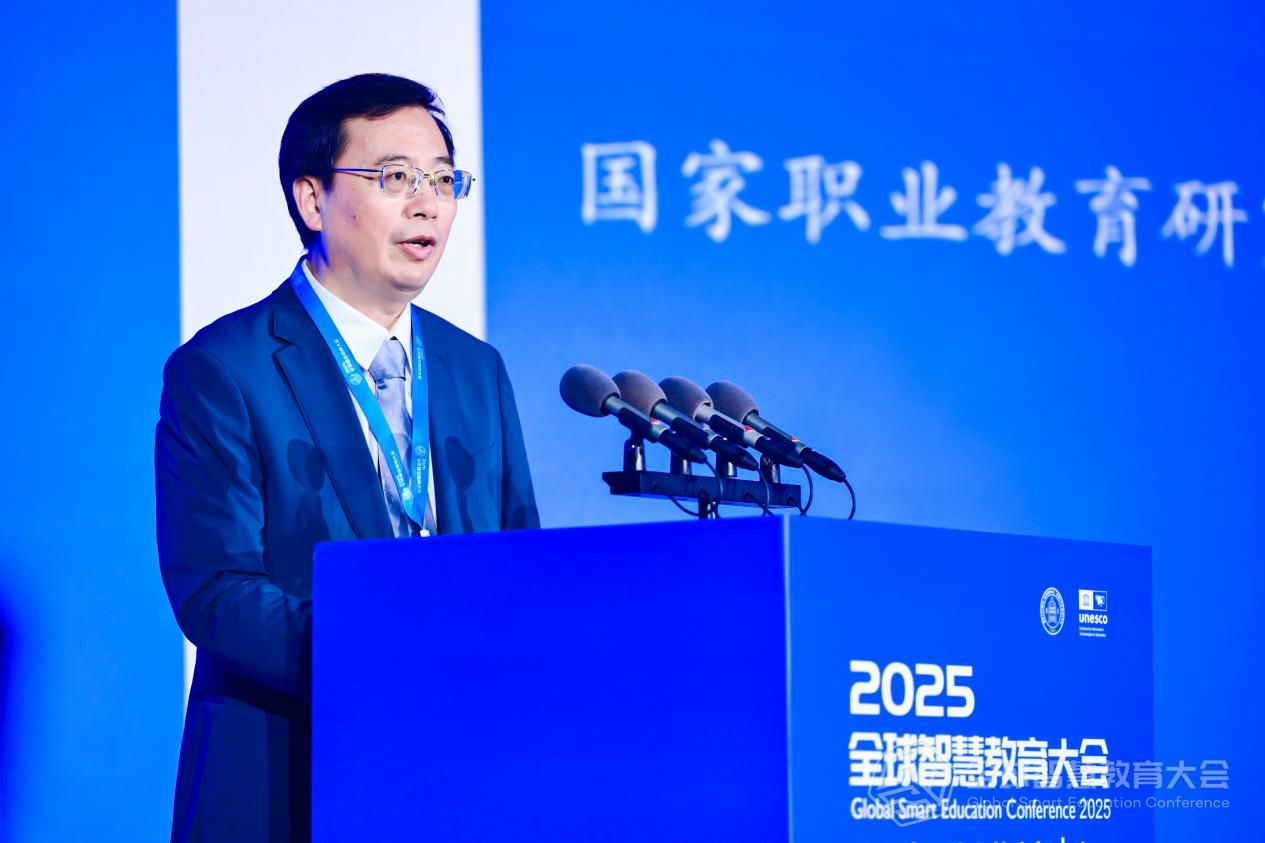
Prof. HE Zhen, Director of the Institute for Vocational and Adult Education, Faculty of Education, Beijing Normal University
Prof. Käthe Schneider, Chair of Adult Education at the Friedrich Schiller University Jena, Germany, highlighted that generative AI has evolved from a tool to a “co-creation partner.” She stressed that TVET must remain vigilant against the loss of subjectivity and advocated for the use of high-quality prompts to turn AI into a “reflection engine” that fosters cognitive, intrapersonal, and interpersonal growth. She further suggested that TVET practices should embed self-reflection throughout the entire human-AI interaction process, replacing one-way dependency with a cycle of “questioning-reflection-re-questioning.” She noted this approach not only amplifies the potential of AI for personalized development but also systematically mitigates the risk of weakened independent thinking abilities.
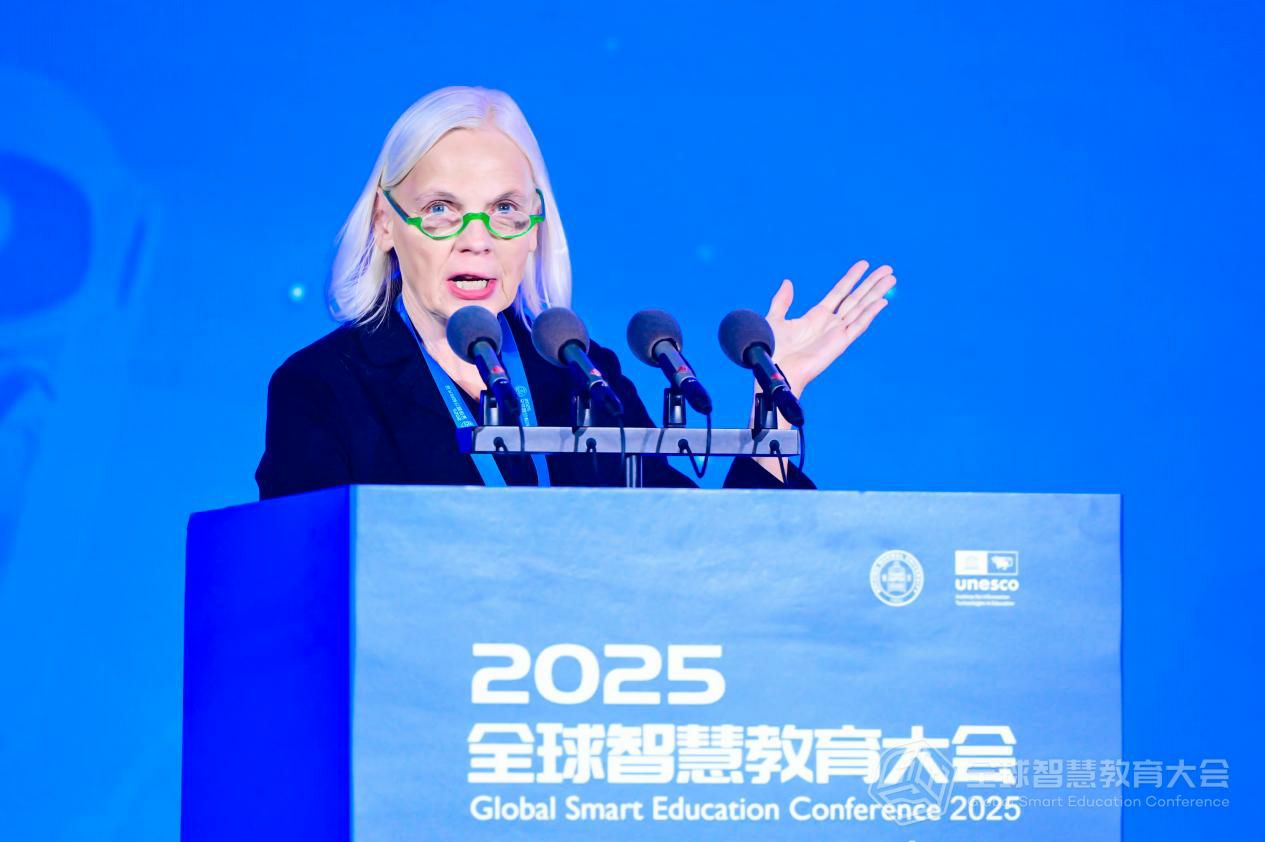
Prof. Käthe Schneider, Chair of Adult Education at the Friedrich Schiller University Jena, Germany
Prof. HAN Xibin, Tenured Professor at the School of Education, Tsinghua University, Member of the Education Digitalization Advisory Committee of the Ministry of Education, and Deputy Director of the Steering Committee for Information-Based Teaching in Vocational Colleges, Ministry of Education, P.R. China, introduced that under the coordination of the Ministry of Education, China has established a digital and intelligent TVET system covering 1,349 majors and serving over 19 million users. He pointed out that the “3C” philosophy of “Connection, Content, and Cooperation” enhances rural internet connectivity and aggregates resources from universities and enterprises, and through it, the system has enabled integration of industry and education and personalized lifelong learning. He noted that in the next phase, China will leverage the “National Educational Digitalization Strategy Initiative 2.0” and the Guidelines for the Application of Artificial Intelligence in TVET to build a global digital community for TVET and create a new ecosystem for future smart education.
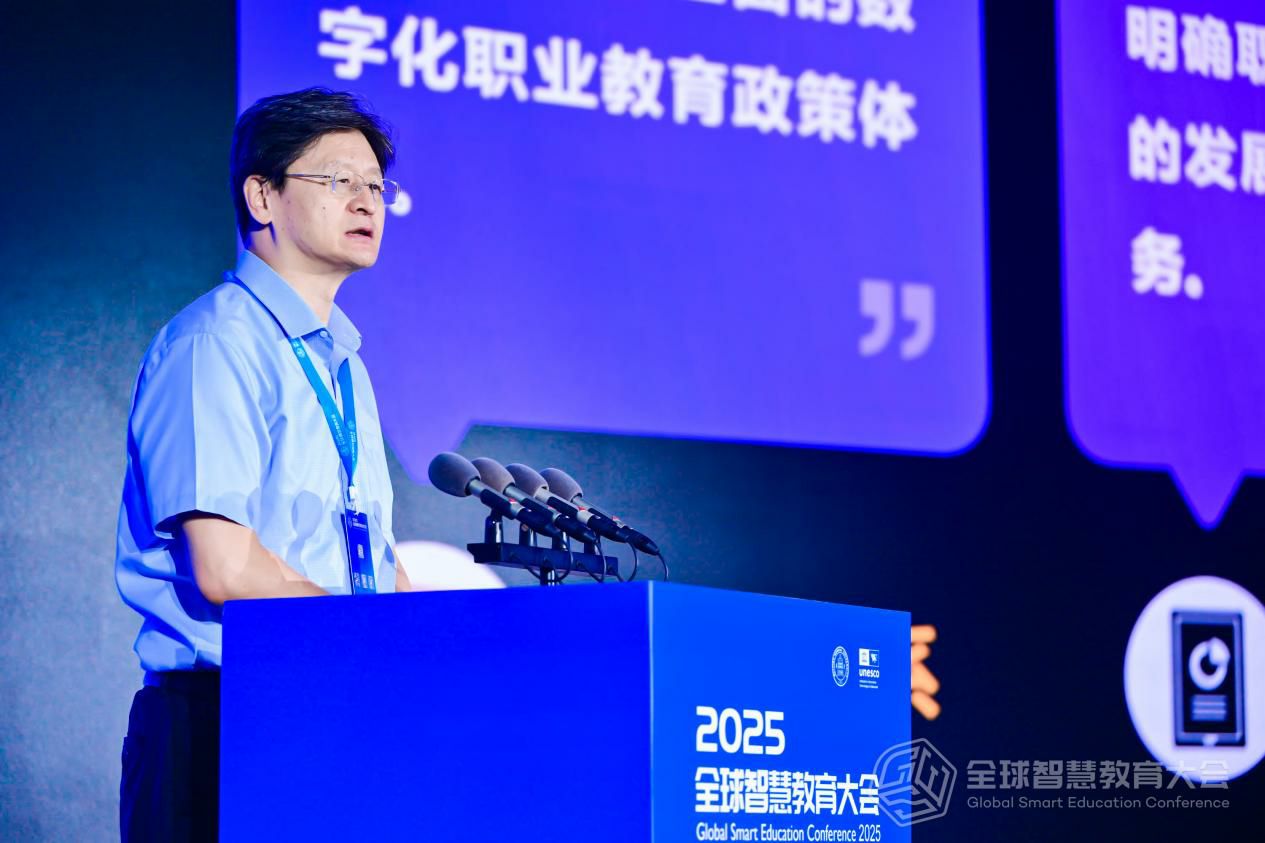
Prof. HAN Xibin, Tenured Professor at the School of Education, Tsinghua University
Prof. ZHANG Buhe, Director and Researcher of the Institute of Vocational Education and Continuing Education, China National Academy of Educational Sciences, shared that China’s vocational education has upgraded from the “3C” philosophy of “Connection, Content, and Cooperation” to the “3I” approach of “Integration, Intelligence, and Internationalization.” The world’s largest vocational education resource repository has been established, serving 33 million learners. Moving forward, it is essential to focus on four key pathways: top-level design, integration of industry and education, enhancement of teachers’ digital literacy, and internationalized training. These efforts will deepen digital reform, synchronize with industrial advancements, and cultivate high-quality and skilled talents for the intelligent era.
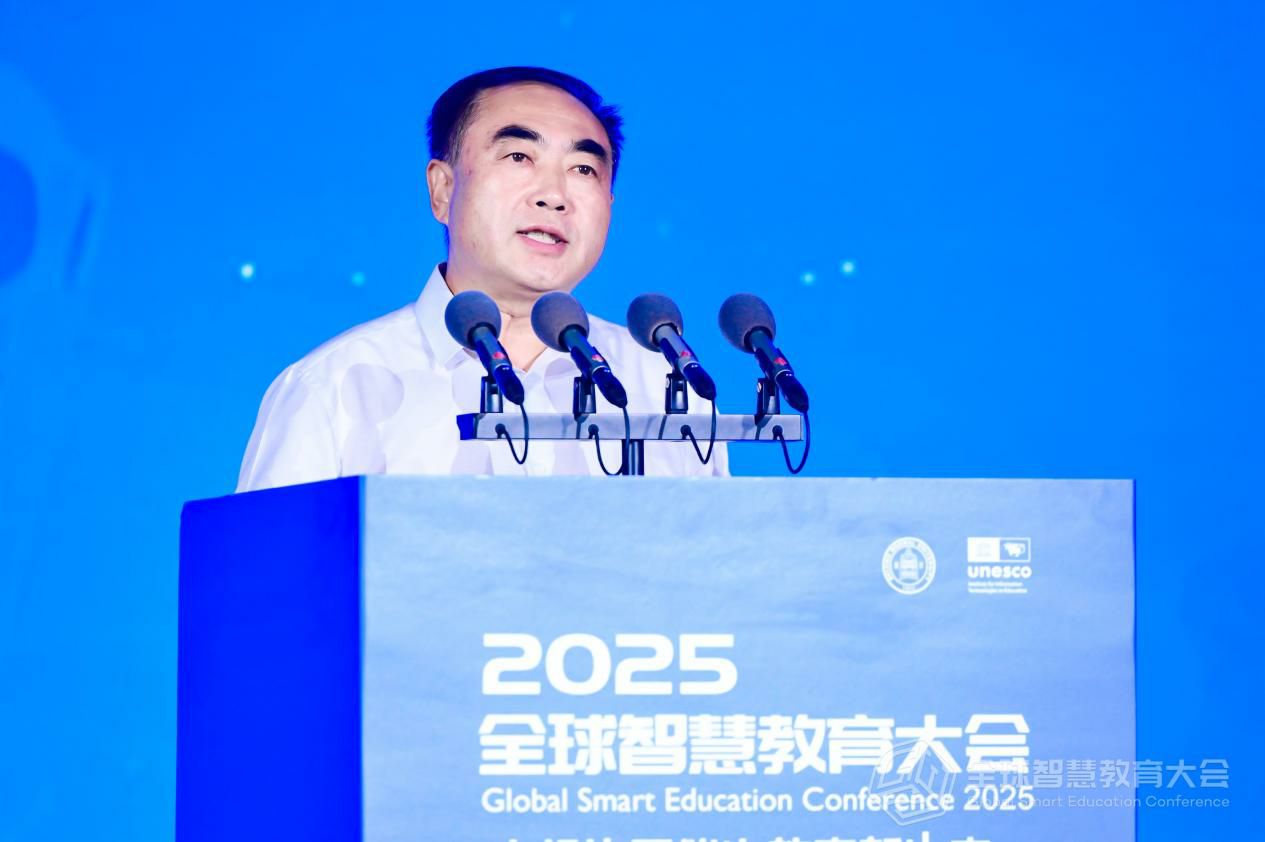
Prof. ZHANG Buhe, Director and Researcher of the Institute of Vocational Education and Continuing Education, China National Academy of Educational Sciences
During the release session, Ms. CHANG Shuang, Deputy General Manager of Beijing Weixun Technology Co., Ltd., introduced the latest achievement: the “Human-AI Collaborative Teaching Super Agent.” Eight guests took the stage to jointly witness the release of the “International Dissemination of Chinese Vocational Education Profession and Curriculum Standards” Open Research Initiative. Mr. ZHANG Peng, Director of the Department of Education Management Information Center and Public Platform of the Ministry of Education, announced the initiative’s launch.
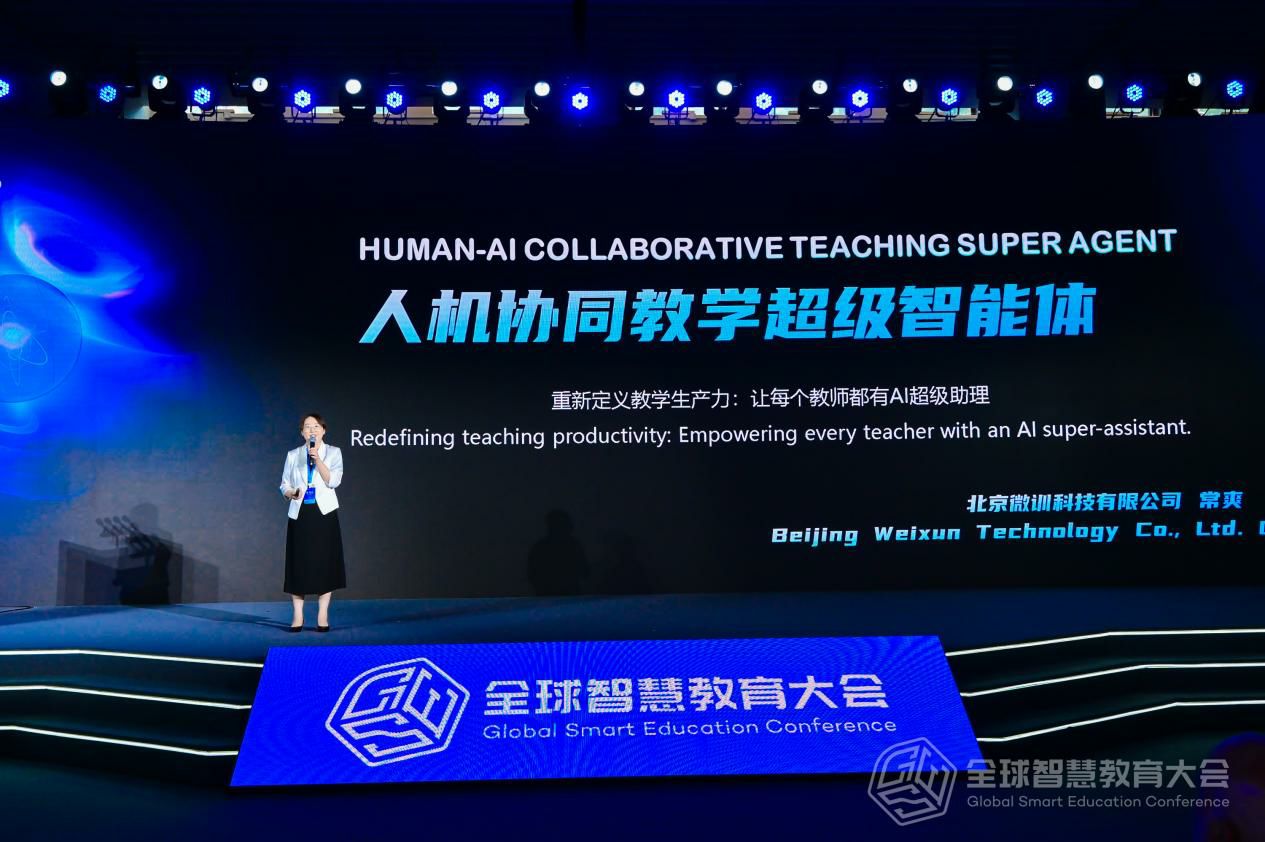
Scene from the presentation on the “Human-AI Collaborative Teaching Super Agent”
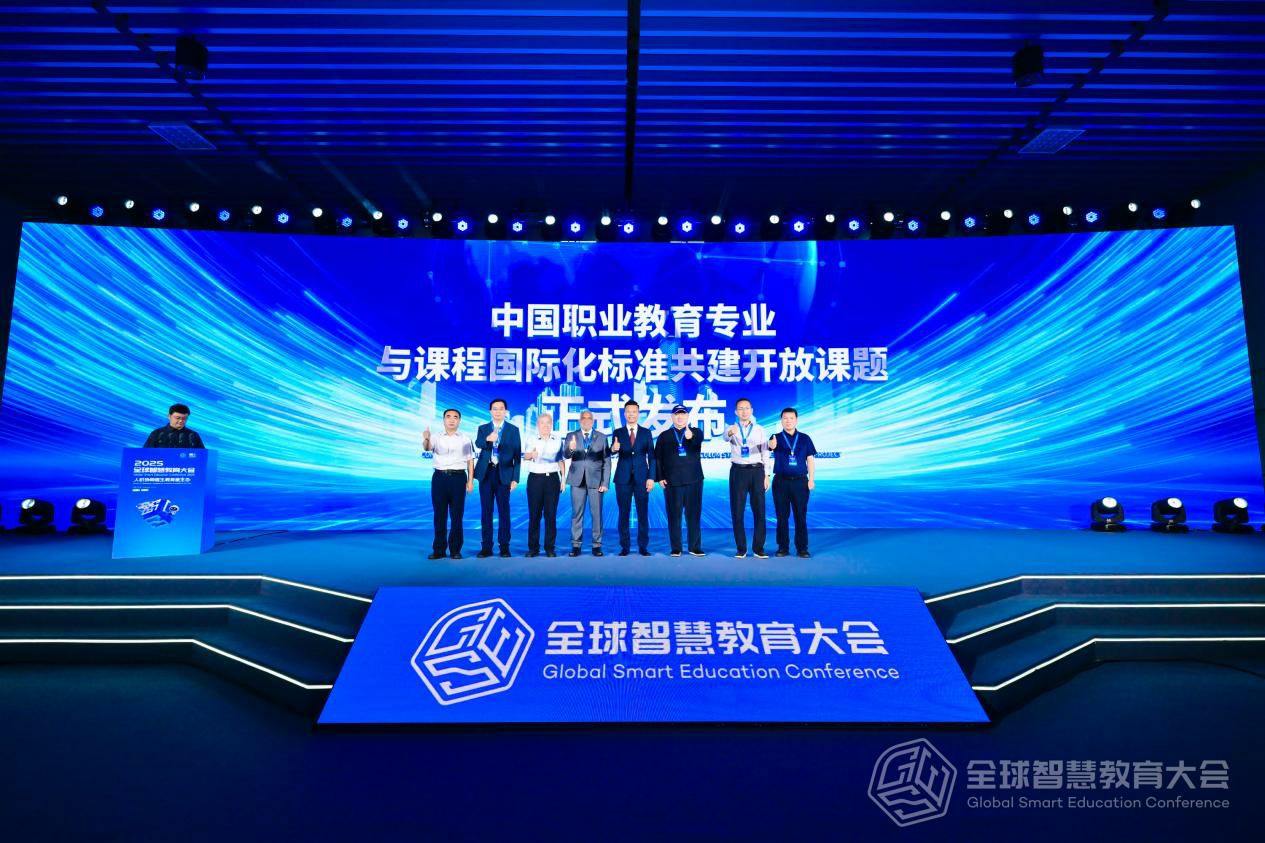
Group photo of guests at the initiative’s launch
During the invited speech session, several guests shared insights on topics such as the development of vocational colleges, the growth of educational enterprises, and the integration of industry and education, with a focus on TVET in the context of digitalization. These speakers included Mr. ZHANG Chengtao, Vice President of Huawei Public Affairs Division, China; Prof. CHEN Jiangfeng, Vice President of Beijing Vocational University of Science and Technology, China; Mr. YU Biao, Senior Vice President of NetDragon Websoft Inc. and Chairman of Fuzhou Software Technology Vocational College, China; Mr. LI Hongyin, Secretary of the Party Committee of Shenyang Polytechnic College, China; Mr. FANG Xu, Vice President of Xianning Vocational and Technical College, China; Mr. Daton Eric NGILINSHUTI, Division Manager of Digital Content and Connectivity, Rwanda Polytechnic; Mr. XU Yunguo, President of Laiwu Vocational and Technical College, China; Mr. ZHANG Dun, Director of the Digital Learning Resource Center at the Open University of China; Mr. MA Yongtao, Vice President of Weihai Ocean Vocational College, China; Ms. LI Mei, Director of the Academic Affairs Office, Hunan Vocational College for Nationalities, China; and Prof. Rory Mcgreal, Professor of Athabasca University, Canada.
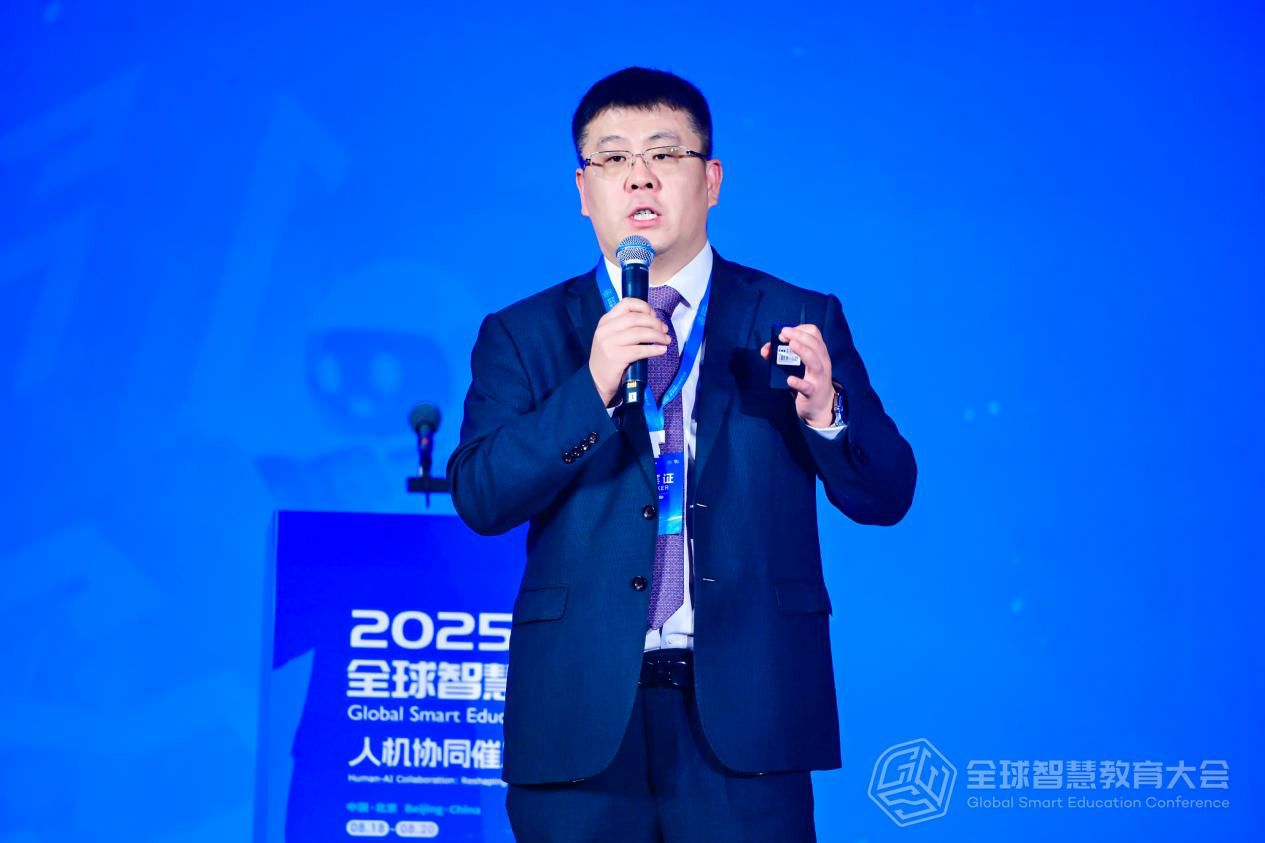
Mr. ZHANG Chengtao, Vice President of Huawei Public Affairs Division, China
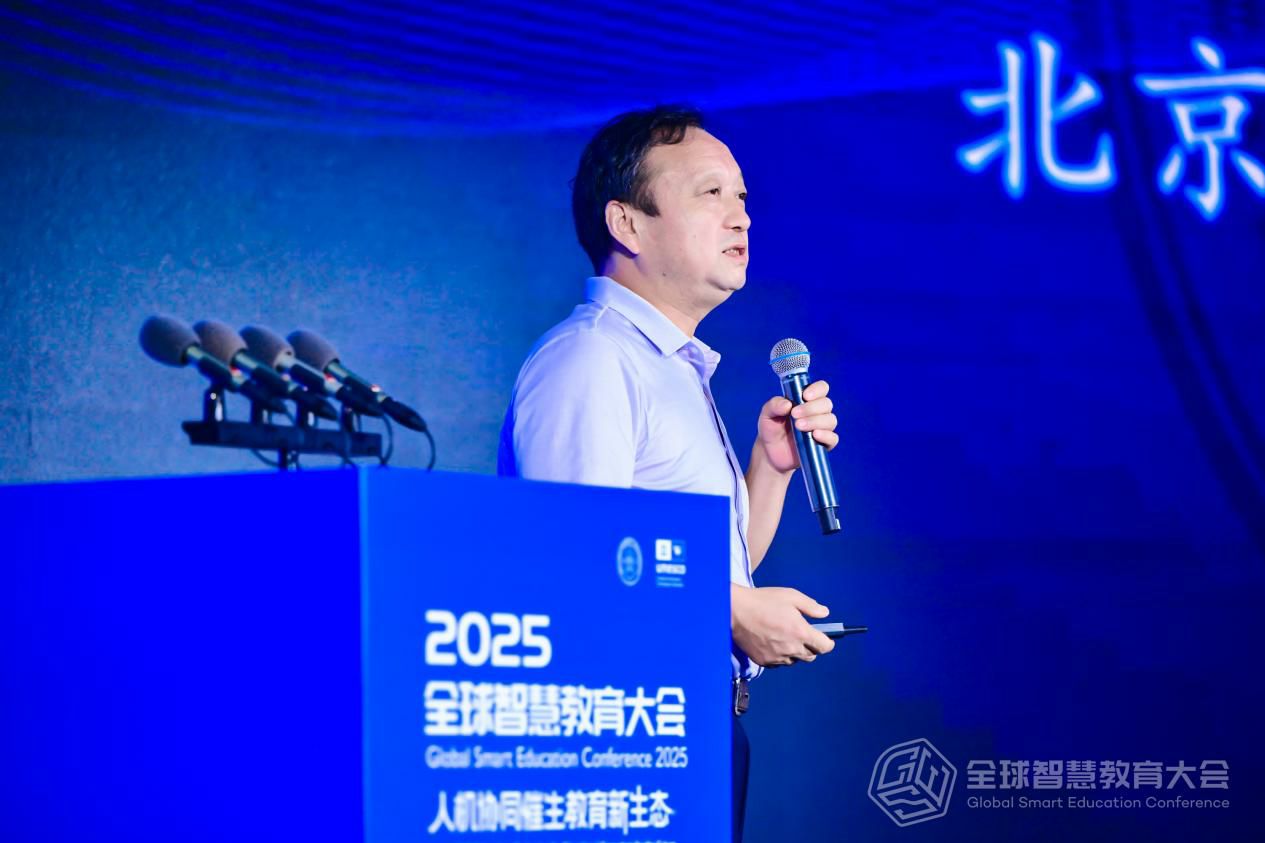
Prof. CHEN Jiangfeng, Vice President of Beijing Vocational University of Science and Technology, China
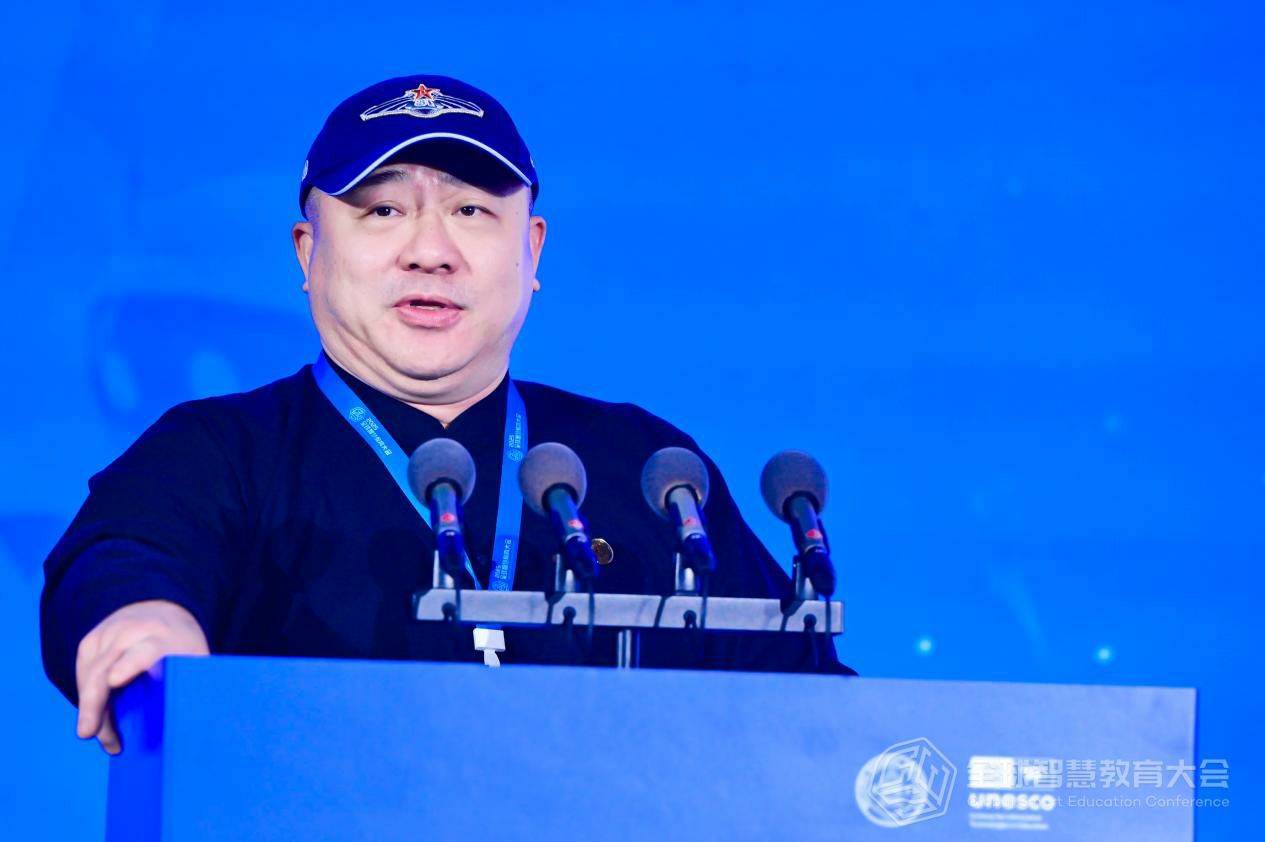
Mr. YU Biao, Senior Vice President of NetDragon Websoft Inc. and Chairman of Fuzhou Software Technology Vocational College, China
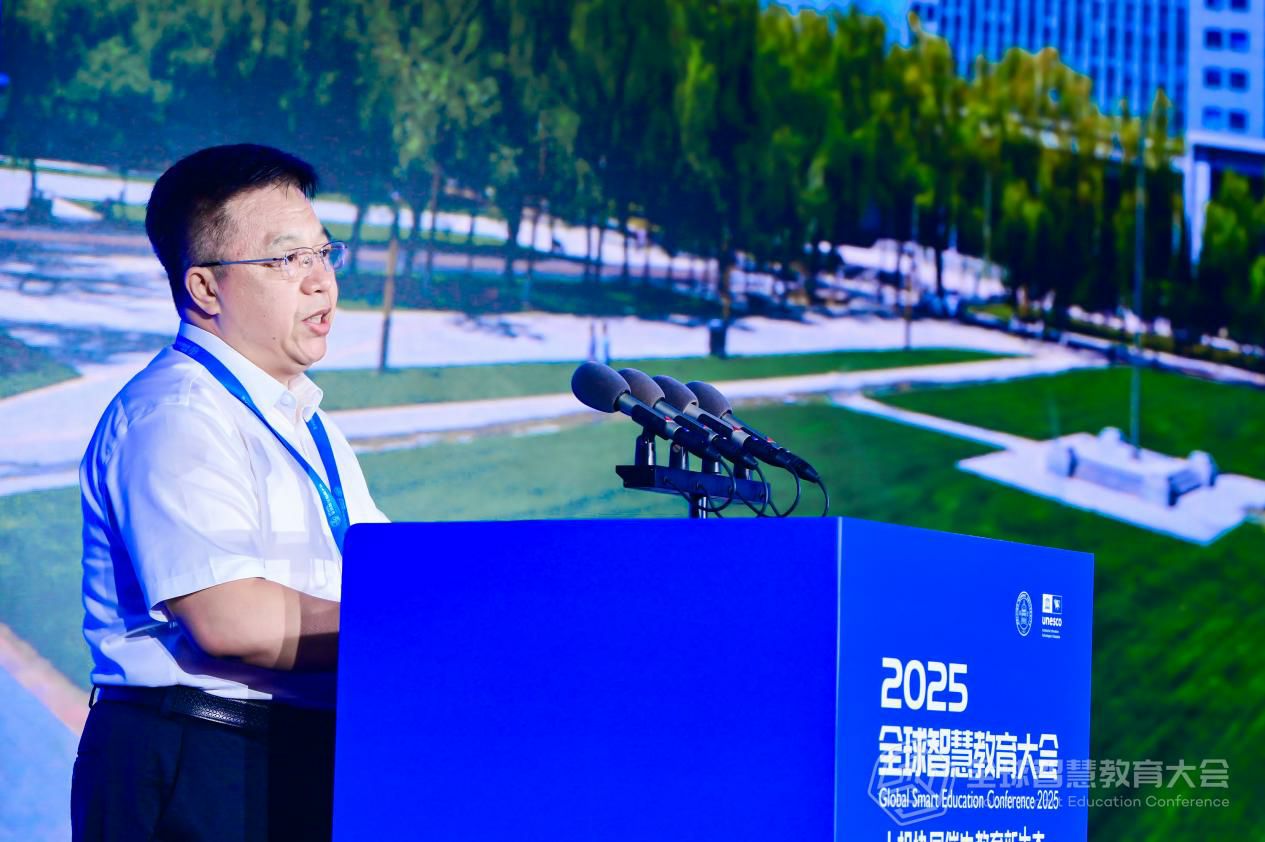
Mr. LI Hongyin, Secretary of the Party Committee of Shenyang Polytechnic College, China
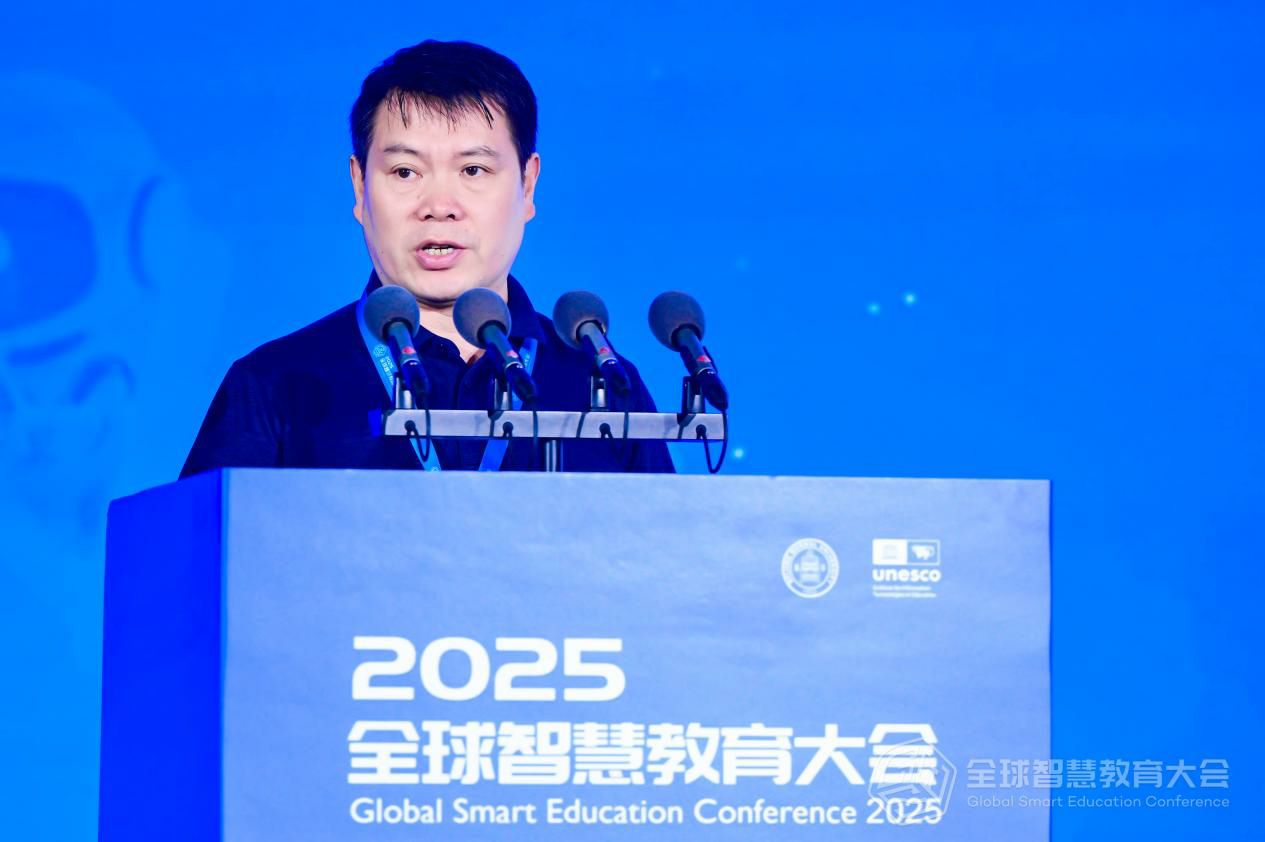
Mr. FANG Xu, Vice President of Xianning Vocational and Technical College, China
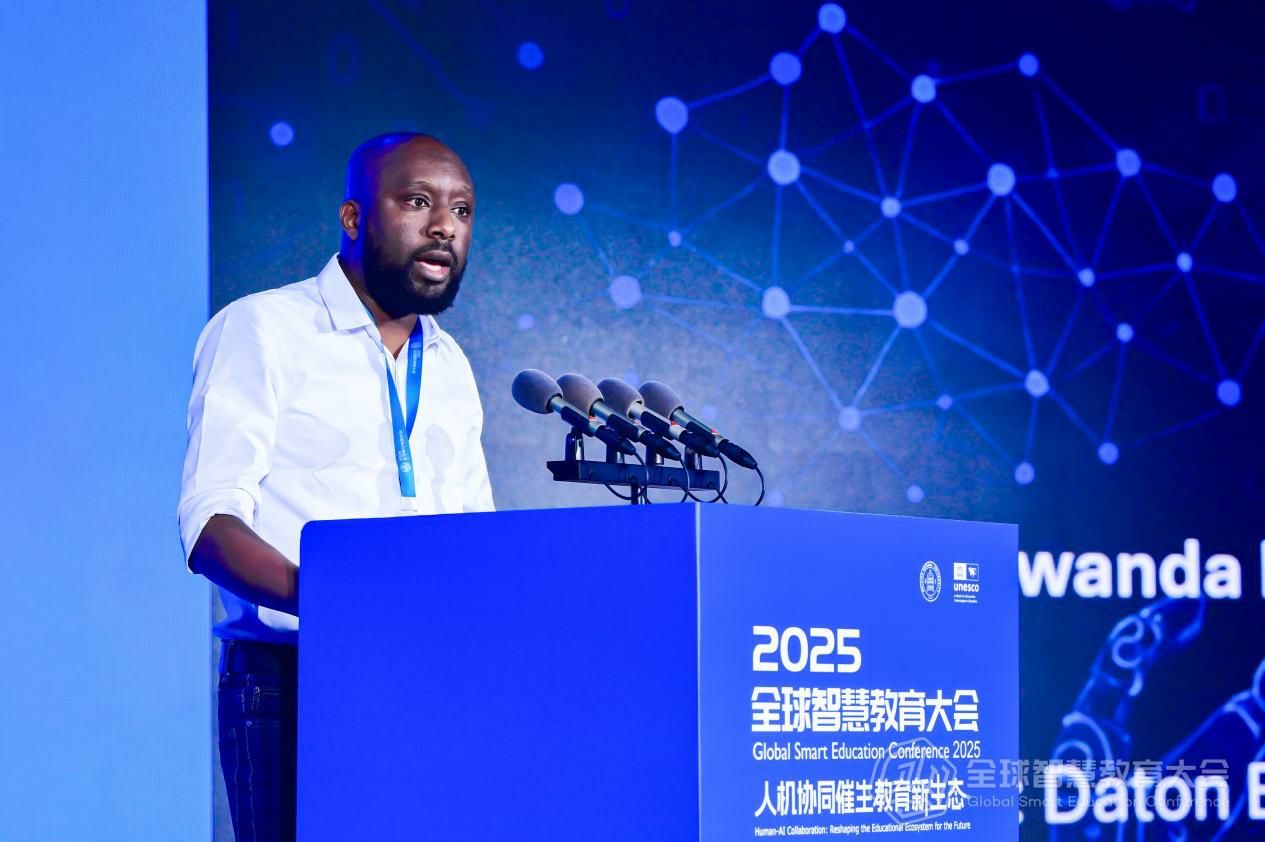
Mr. Daton Eric NGILINSHUTI, Division Manager of Digital Content and Connectivity, Rwanda Polytechnic
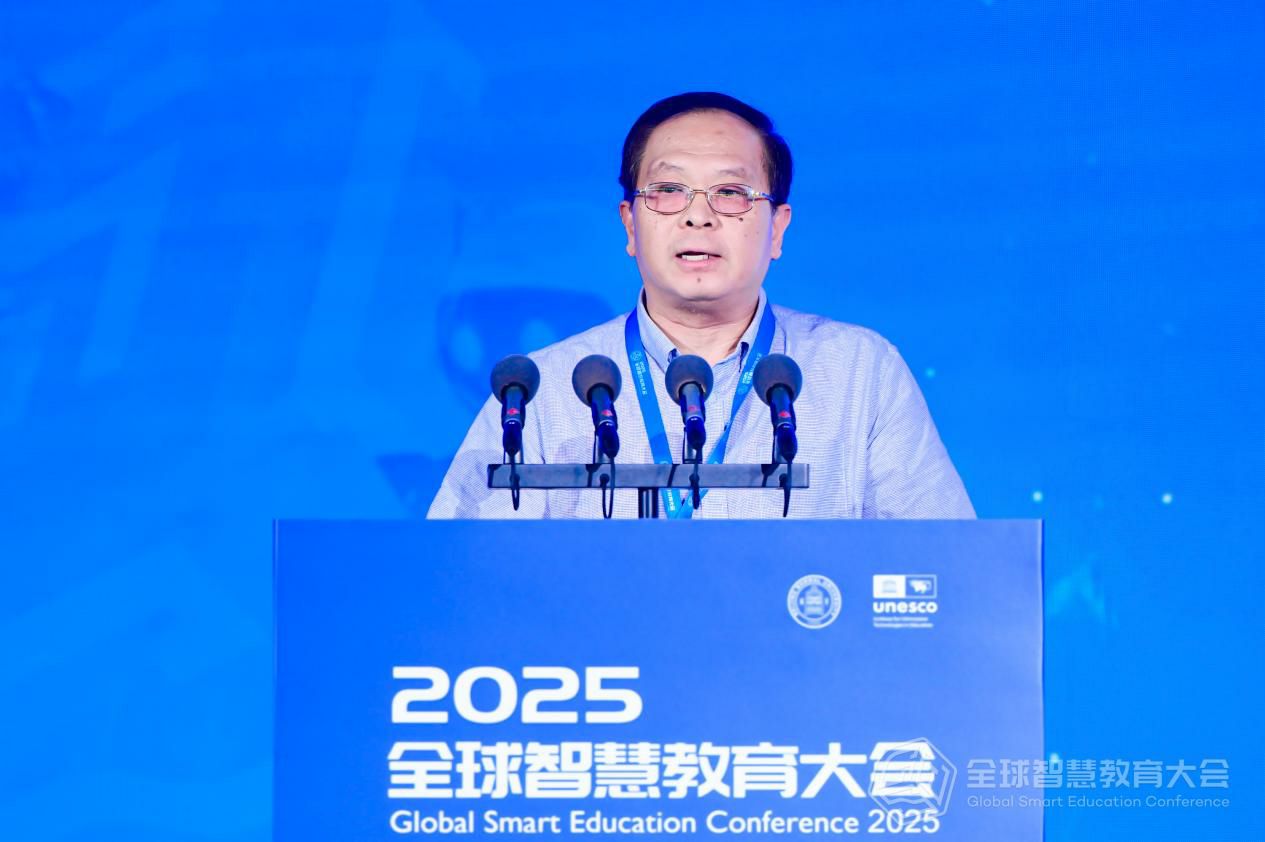
Mr. XU Yunguo, President of Laiwu Vocational and Technical College, China
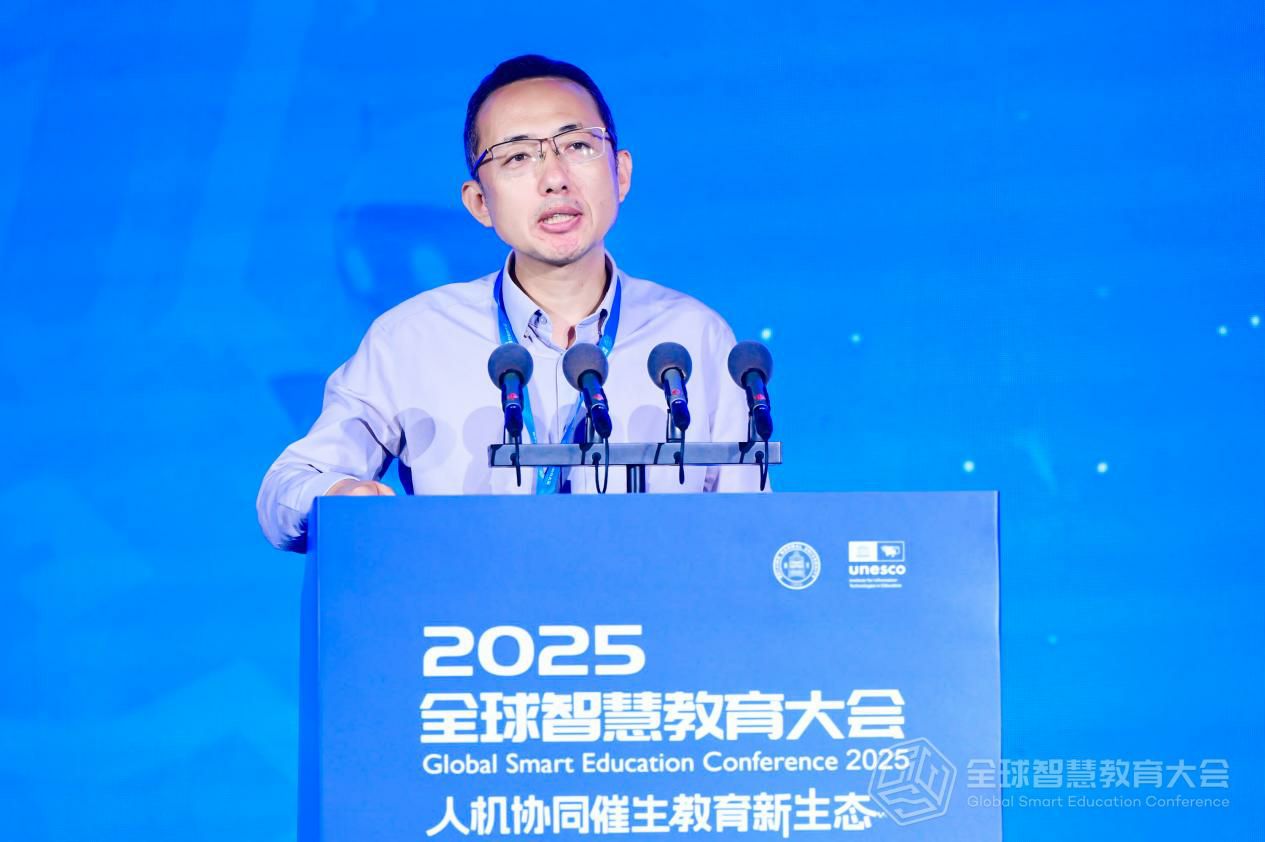
Mr. ZHANG Dun, Director of the Digital Learning Resource Center at the Open University of China
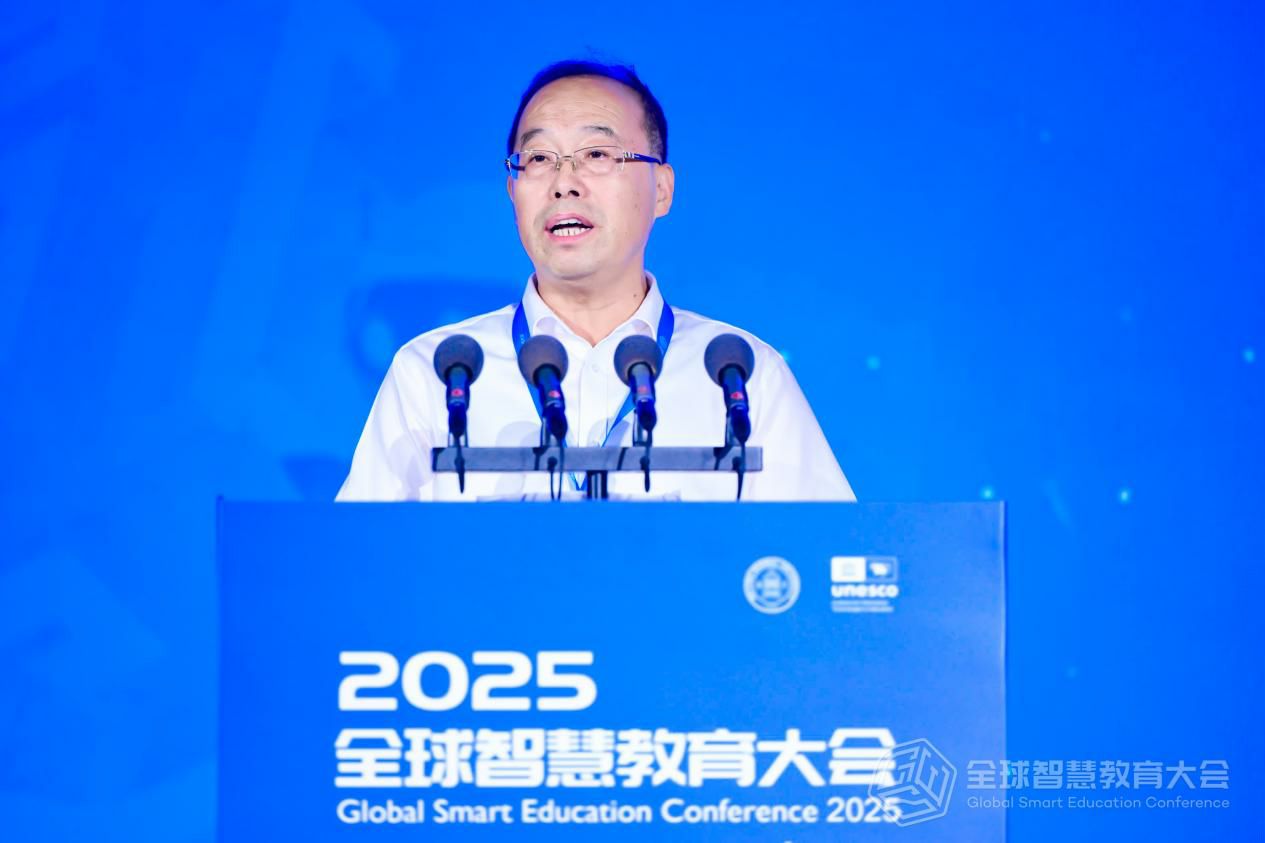
Mr. MA Yongtao, Vice President of Weihai Ocean Vocational College, China
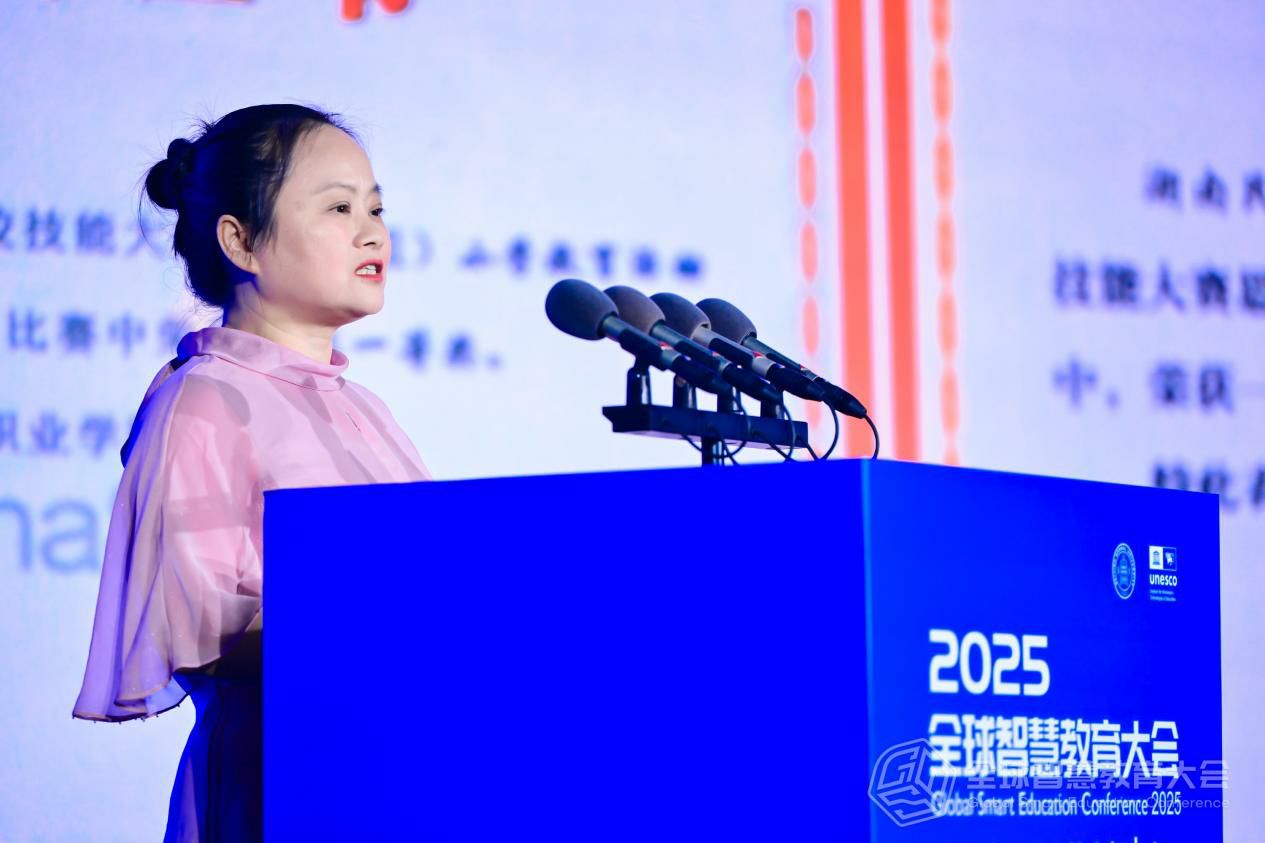
Ms. LI Mei, Director of the Academic Affairs Office, Hunan Vocational College for Nationalities, China
The forum was co-chaired by Mr. DENG Lidongguang, Director of Sports Entertainment and Education Business Group of CCTV.com, China, Mr. Khat Prumsochetra, Deputy Director of Southeast Asian Ministers of Education Organization Regional Center for Technical Education Development (SEAMEO TED), Mr. ZHANG Peng, Director of the Department of Education Management Information Center and Public Platform of the Ministry of Education, and Prof. WANG Feng, Vice President of Suzhou Vocational University, China.
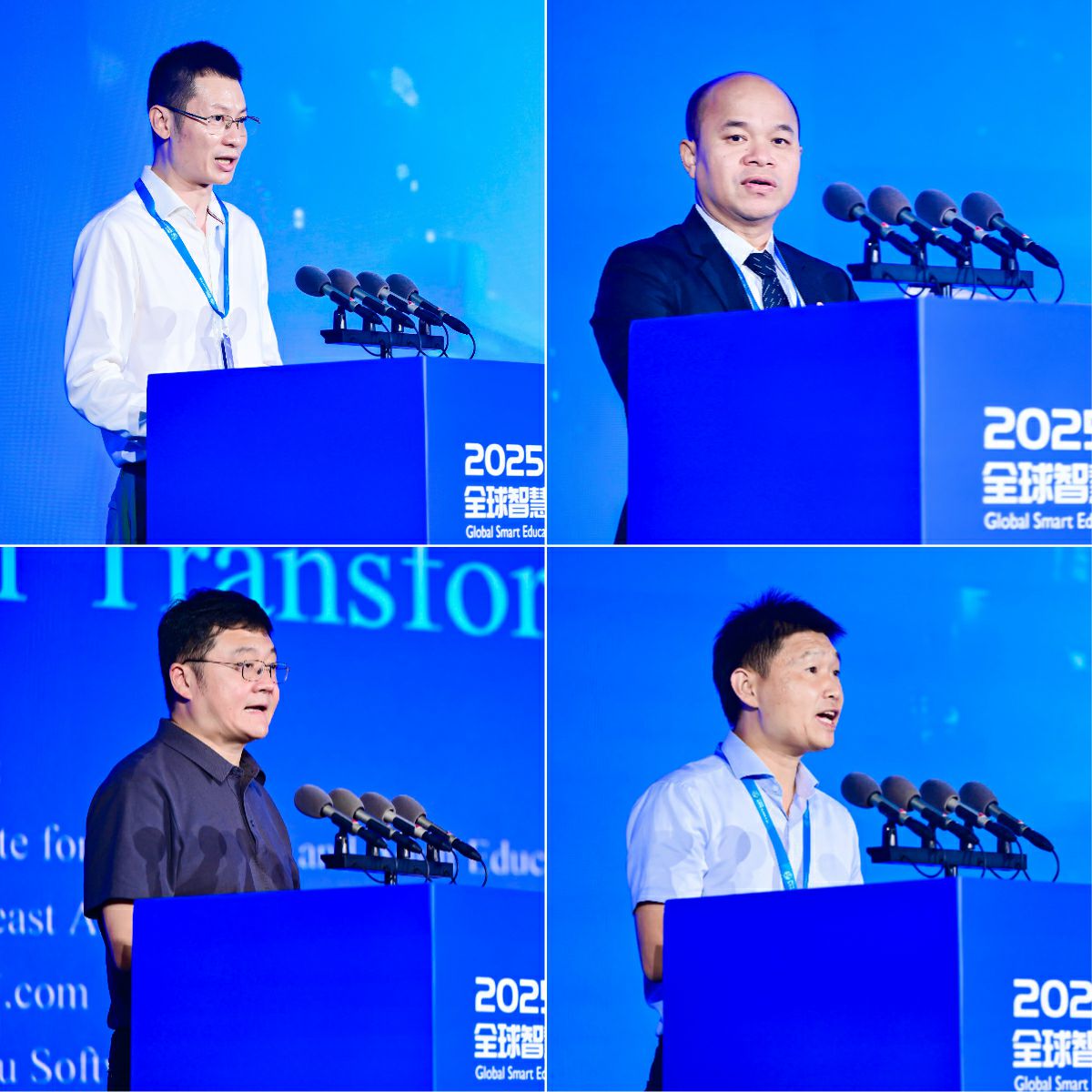
In the upper left: Mr. DENG Lidongguang, Director of Sports Entertainment and Education Business Group of CCTV.com, China; in the upper right: Mr. Khat Prumsochetra, Deputy Director of Southeast Asian Ministers of Education Organization Regional Center for Technical Education Development (SEAMEO TED); in the lower left: Mr. ZHANG Peng, Director of the Department of Education Management Information Center and Public Platform of the Ministry of Education; in the lower right: Prof. WANG Feng, Vice President of Suzhou Vocational University, China.

